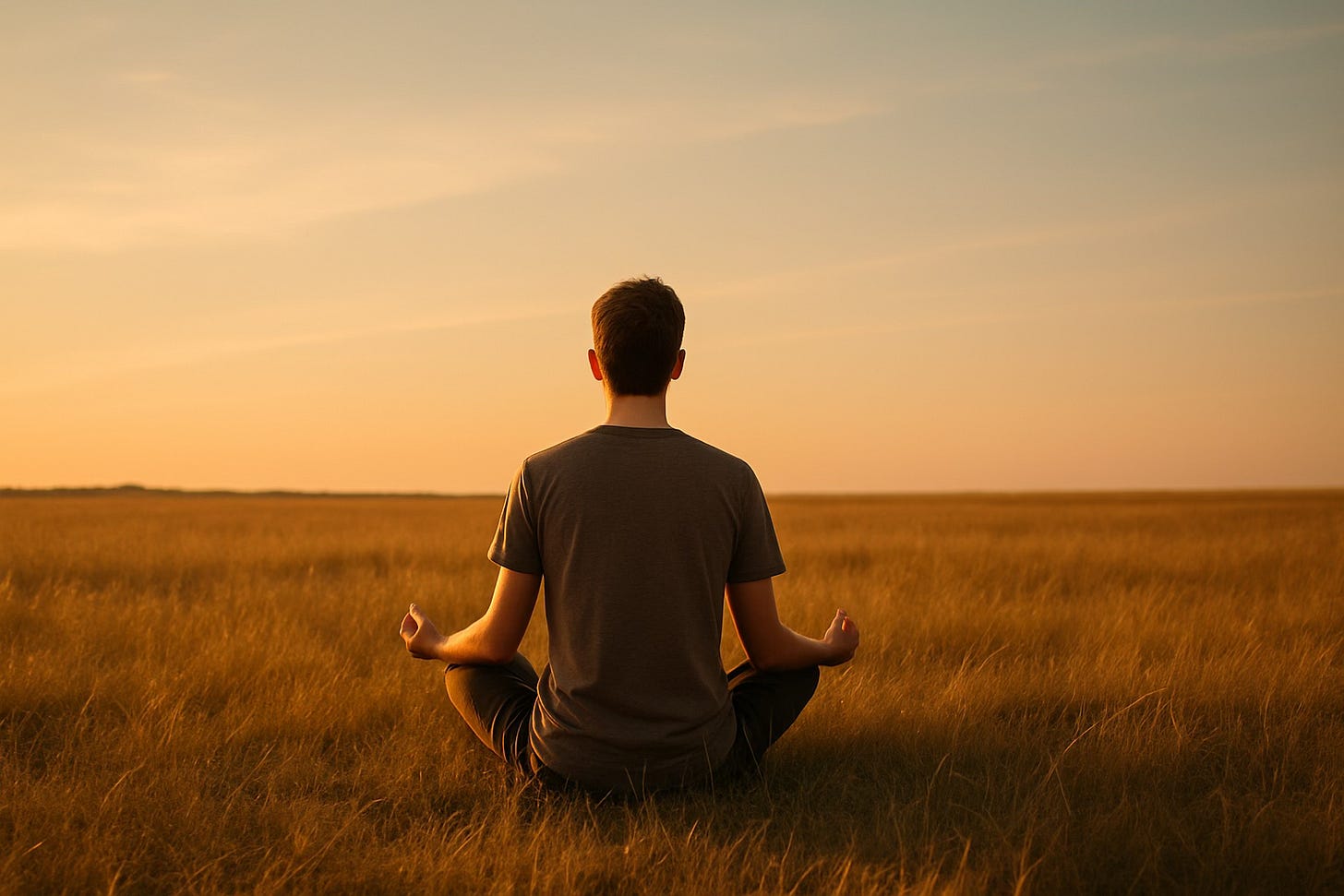Can Silence Be a Kind of Universal Medicine?
Silence demands courage. The courage to face discomfort. The courage to stop escaping. The courage to be with what is real.
A recent article in The Washington Post reminded of the months I’ve spent in silent retreat centers over the decades; I used to be a regular at Karme Choling in Vermont and used to run and teach retreats at the Omega Institute in New York.
The article’s titled “Silent retreats are surging in popularity. Religion is optional,” and describes how more and more people are turning toward silence and meditation to find rest, clarity, and healing. And it works not only those rooted in religious practice but many people who don’t identify with any particular faith.
I find this deeply resonant. I have seen that across life—in work, in family, among friends, and in my own heart—there’s always been a deep hunger to escape the noise, to breathe, to drop into something more essential.
The article reports that retreat centers spanning Buddhist, Catholic, Jain, even Jewish traditions are seeing increased attendance, often from people who are spiritual but not religious. “People are attracted here who want to go deeper,” said Father Guerric Heckel of Mepkin Abbey.
What strikes me is that silence offers a kind of universal medicine. When I’ve been in silence I can hear parts of myself I usually ignore; the anxious churn, the restless longing, the grief hiding below the daily demands.
Silence becomes a space where I can observe rather than react. The article describes participants sitting quietly, walking and standing in silence, avoiding even nodding or waving, so that communication becomes less about performing and more about presence.
In business, this could also be transformative. I think about our hurried meetings, the constant pings of messages, the sense that we must always be “on.” If we carve out silence—even just scheduled time—perhaps teams could reset, listen, and come back with more clarity.
In family life, silence can open up space to see what’s really going on beneath the surface: the needs unmet, the resentments unspoken, the love that gets lost in noise. Among friends, silence doesn’t need to be awkward; it can be shared simply, in mutual felt presence, restoring connection without words.
Years ago I was sitting in the backyard of our then-home in Atlanta with a dear friend who was a Japanese businessman, a senior executive in a Japanese bank. We’d been talking for a while, and then just naturally fell into silence for a long few minutes. He broke the silence by telling me that in the culture he’d been raised in, sitting together in silence without feeling the need to speak was a sign of a deep friendship.
The Post article also speaks to how these retreats are physically and mentally demanding: sore backs, restless thoughts, discomfort. But that discomfort itself can teach us something. Marilyn Kaman, a longtime Zen practitioner, said that when your back or neck hurts you’re meant to “look at the pain and get through.”
In life I believe hardship, whether physical, emotional, relational, or spiritual, often shows a threshold: cross it—not to deny it but to notice it—and something opens up.
I remember one story from the piece: Brittlee McClung was an anxious person, mother of two, who first attended a silent retreat after practicing meditation for months. In those four hours of silence, she said — echoing my own early experience with silent retreats — it felt like a little rebellion “to just sit and be.” She said that just being around others who were doing the same made it easier.
I think this is key: we’re not alone in our longing for peace. Even if silence is an individual act, its effects ripple through the container of all who share it.
Another quote that stays with me is from Rabbi Jordan Bendat-Appell:
“Mindfulness isn’t Jewish or Buddhist or Christian. It’s human. It flows from having a human life.”
That words feels like a touchstone. We don’t need religion, doctrine, or belief systems to justify silence or meditation. What we need is recognition of our shared condition: that life is loud, that we suffer, and that we seek meaning, calm, rest.
This practice of silence can become a way of attending to the edges of ourselves. The places we avoid. The places we protect. When I allow silence, I allow my edges to soften. I allow my judgments, my tension, my frenetic planning to rest.
In work that might mean listening better: to what people say, and to what they don’t say. In family it might mean pausing before reacting. In friendships it might mean being fully present rather than multitasking emotionally. For myself, it often means sitting quietly with what is there rather than seeking distraction.
Silence doesn’t solve everything. The article makes clear that retreats aren’t easy and that many are drawn by what’s broken or overwhelming. But from what I’ve experienced, silence is not passive. It’s extraordinarily active.
It demands courage. The courage to face discomfort. The courage to stop escaping. The courage to be with what is real.
So I’m committed to exploring silence more deeply in my life: to carve out time each week when I disconnect from devices, to practice periods of quiet even in ordinary moments, to allow space for reflection instead of rushing through. And I invite you to do this too; not because silence is some elevated ideal, but because it opens us all to a richer way of living.
When we open ourselves to silence we don’t just escape noise. We come back more awake. We come back more able to see, to feel, and to act with connection and care.
We come back more real.


